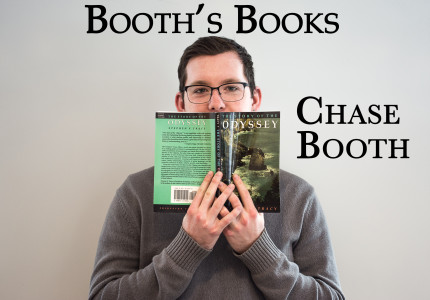Column by Chase Booth
boothcha@grinnell.edu

I think it’s fair to say that one does not simply stumble upon LGBTQIA literature—it must be sought out by interested parties. This is especially true for young adult (YA) literature where coming-of-age themes often don’t include explorations of sexual identities, particularly if those identities are queer. That’s why I latched onto Benjamin Alire Sáenz’s most recent YA novel, “Aristotle and Dante Discover the Secrets of the Universe,” an honest and compelling coming-of-age story about two young boys exploring identities of family, race and queer sexuality.
Aristotle (Ari) and Dante meet at their community pool and become fast friends despite their opposing personality traits. Ari, our narrator, is subdued, quiet and holds a lot of unresolved anger about his family’s dark past. Dante is exuberant, free-spirited and open about his struggles with his racial and sexual identity. Dante is a poet and a philosopher; Ari is a loner and a fighter. Their budding friendship is as easy and innocent as the lazy days of their summer together in Southwest America.
Because Ari narrates the story, it’s his inner thoughts and struggles which drive the narrative. We learn that Ari’s reticence may be the result of his family’s history of secrets—his father fought in Vietnam but refuses to divulge details about what he experienced during the war, and his brother is in jail for a mysterious crime which no one ever talks about. In a way, Ari views Dante as someone who is his complete antithesis. Dante is too open, too liberal with sharing what’s on his mind. He has feelings and isn’t afraid to express them, even if Ari doesn’t want to hear them. And when Dante moves away at the end of the summer, it is he, not Ari, who continues their correspondence. Dante sends frequent letters to his friend from his new home in Chicago about all the new things he’s trying—drugs, alcohol, kissing girls, and his secret desire, kissing boys. When Dante moves back he confides to Ari that he may want something more than just a friendship with him. The novel explores the tension this creates in Ari and Dante’s friendship.
I think Sáenz, as someone who came out fairly late in life, superbly captures the anxieties which young teens may have in the process of exploring non-conventional identities. Ari, in a rare moment of self-realization, recalls his mother telling him once that, “We all fight our own private wars.” In reading this book, I could tell that Sáenz was writing out some of his own private wars with coming to terms with his identity, both as a Mexican-American and as a gay man. I enjoyed watching Ari think through his emotions, especially since this is the kid who said at the beginning of the novel that, “I had a feeling there was something wrong with me. I guess I was a mystery even to myself.” Ari coming to terms with himself by the novel’s end sounds like a corny trope but is masterfully done by Sáenz in a forum aimed at young adults.
Sáenz also depicts the harsh realities of living with non-normative identities. There are hate crimes, bullying and one particularly awful moment of trans violence which seems out of place in a YA novel. But the violence isn’t gratuitous (not that there’s an acceptable level of violence), and Sáenz deals with it in a very serious and honest way.
Most of all, this novel is adorable and will most definitely make you weep tears of happiness at the end. The writing, although simple, is brilliant. There are so many quotable passages, but this one has stuck with me: “I got to thinking that poems were like people. Some people you got right off the bat. Some people you just didn’t get—and never would get.” Sáenz offers many astute gems like this for his readers, both apt for the novel and applicable to one’s own life. If you’re looking for your first foray into queer literature, especially books about coming of age, this novel is a good place to start.



















































